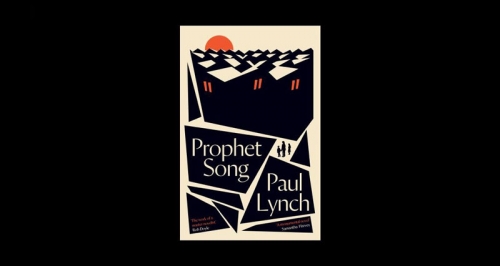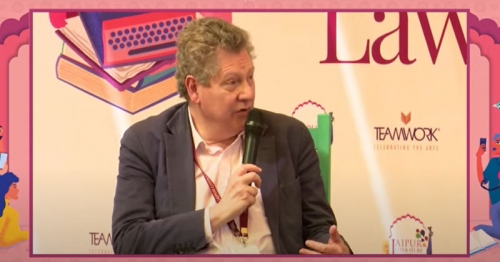After Trainspotting
Irvine Welsh in conversation with Chandrahas Choudhury
Although he’s primarily known for writing the cult classic Trainspotting, Scottish author Irvine Welsh has worn the many and varied hats of fiction author, playwright, screen writer, actor, DJ, and punk rocker,over the course of his highly eventful life. Welsh thanked the audience for turning up for an early Monday morning session, admitting that it was an unusual time for him too: “This is usually around the time I come home after DJ-ing.”
Indian novelist ChandrahasChoudhurydescribed how Trainspotting became a runaway success among people who aren’t part of the regular literary establishment: “Most of the people who bought and read Trainspotting had never bought or read any books before, which puts you in the same category as the Bible.” Welsh was happy with the comparison, joking, “I like to see myself as a pseudo-biblical figure,” adding that another unusual facet of Trainspotting’s success was that “it was the most shop-lifted book in Britain, mostly by myself.”
Describing himself as a “gateway” to the world of reading, Welsh recounted an anecdote where he met a man who, having just served a stint in prison, had been turned on to reading by Trainspotting. Years later, Welsh met the man again, who had since become a Professor of English Literature at a university in Texas. Welsh noted that when he asked the man what he thought of his work since Trainspotting, he responded, “Oh, I don’t read your books any more, I’ve moved on to better literature.”
Welsh’s oratory, much like his writing, was replete with his acerbic wit and humour, which usually emanates from people living in difficult situations. Talking about the themes of adversity and disenfranchisement present in his work, Welsh described Trainspotting as “a novel about industrialisation”. He highlighted how the characters in Trainspotting were a product of Britain in the 70s and 80s, where working-class jobs in the manufacturing and mining sector were destroyed by Margaret Thatcher’s new economic doctrines.
He spoke of how the current drive towards the automation of white collar work means that “we’re all facing this existential crisis that people from the industrial working classes faced before”. Welsh added that “if you look at any kind of society in transition, there was a plague” associated with it. He noted that in the current “transfer from capitalism to conceptualism, the resulting plague is drugs; they’re used for pain management but they’re also used for consciousness expansion.”
Drugs have been a recurring theme in Welsh’s work, from the brutal portrayal of heroin addiction in Trainspotting to Porno, which showcases pornography as a similar addiction. He highlighted how the modern day opioid crisis (prescription drug addiction) was created by a system that “conflates prescription drugs with health”, adding that the industry’s focus is now on primarily ensuring that people are “being kept alive but also being kept ill at the same time.”
Welsh noted that “Whether I’m pro- or anti- drugs is very irrelevant and trite,” pointing out that people’s focus on drugs in his writing was irrelevant: “drugs are a pretty unremarkable part of everyday life, rather than something to be celebrated or feared.”








